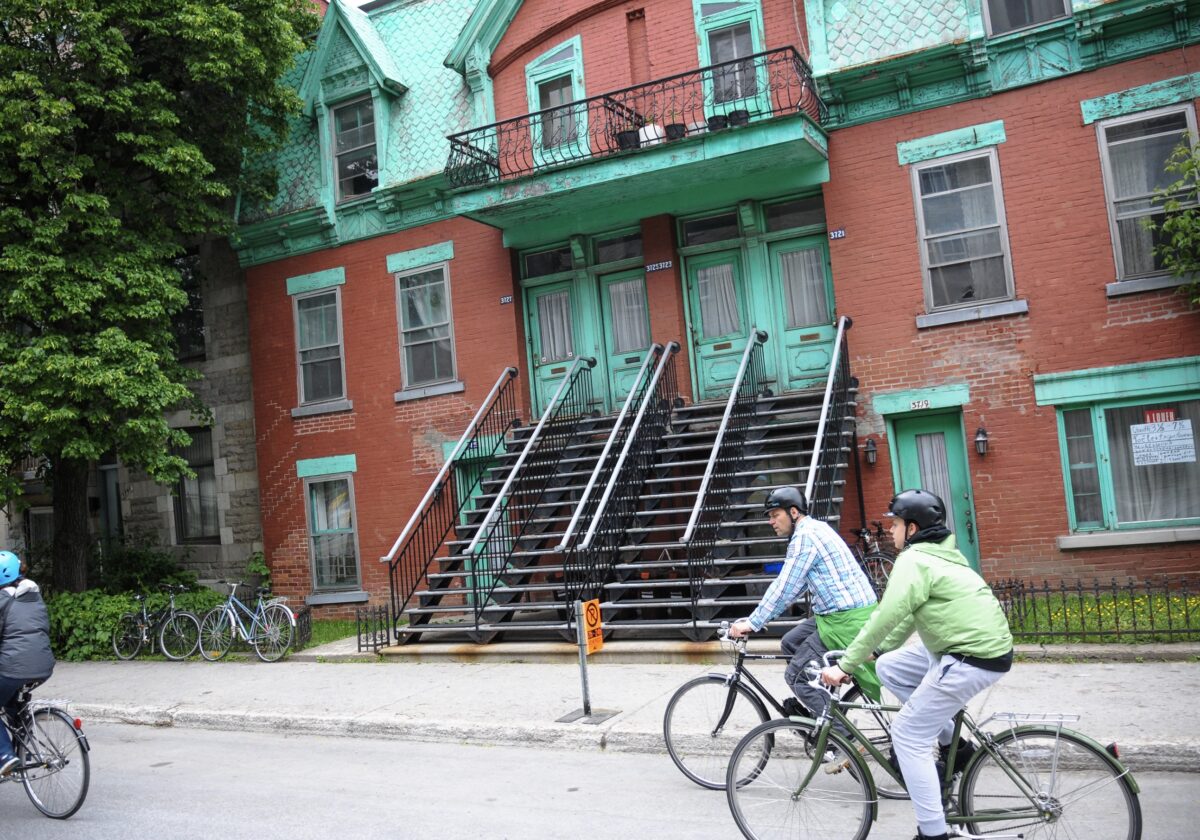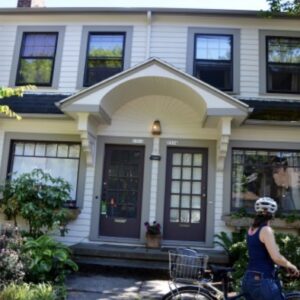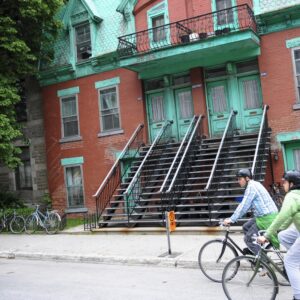
(Photo: Jonathan Maus/BikePortland)
“These events are opportunities for everyday people interested in these subjects to bump elbows with people who are doing this work nationally.”
— Aaron Brown, organizer
At first blush, someone might not think housing and bicycling have much of a relationship. Indeed, that’s often how these two issues are framed – as separate realms within urban planning that can operate relatively independently. But they absolutely cannot!
The only way we achieve our adopted goal of 25% of trips by bike by 2030 is with a massive shift in housing policies and projects.
At next week’s YIMBYtown (YIMBY stands for ‘yes in my backyard,’ the inverse of NIMBY or ‘not in my backyard’) conference, organizers hope to further connect these issues and is billed as a, “catalyst for unifying housing organizers, funders, builders and thought leaders on a national scale.”
The conference has been held three times in the past, with the first taking place in Boulder, Colorado in 2016. The Portland YIMBYtown has been a long time in the making, having been pushed back from 2020 due to the pandemic. Finally, YIMBY activists from across the country will convene right here in Portland next week: the first time in almost four years for people passionate about this work to meet in real life and share ideas.
This conference, which is being co-sponsored by the Sightline Institute and pro-housing group Portland: Neighbors Welcome, will feature a diverse range of local and national experts and activists. Speakers hailing from Portland include transportation consultant Jarrett Walker, youth anti-freeway climate activist Adah Crandall, urban economist Joe Cortright, former BikePortland News Editor Michael Andersen (now with Sightline), and others. National speakers include Saint Paul City Councilor Mitra Jalali, Emeryville Mayor John Bauters and Jesse Piedfort, director of Sierra Club’s Washington State Chapter.
But wait, there’s more! BikePortland’s special correspondent Ryan Packer will moderate a panel on fighting the freeway industrial complex.
Aaron Brown, a Portland transportation and housing advocate who’s co-organizing YIMBYtown 2022, says this year’s conference will feature transportation-related issues more prominently in years past. Brown wears many hats, as the co-founder of No More Freeways PDX who’s also on the board of Portland: Neighbors Welcome, and says he’s excited about the opportunity to further discussion between transportation and housing advocates.
With panels on what fighting freeways means for the movement for abundant housing, reconnecting communities divided by highways and parking reform, there looks to be plenty to satiate transportation activists while hopefully encouraging new ways of thinking.
Advertisement
 Although it’s no secret that Portland’s transportation and housing advocates have plenty of gripes with this city, Brown says he’s excited for the chance to show off the great things we do have going for us to advocates from across the country.
Although it’s no secret that Portland’s transportation and housing advocates have plenty of gripes with this city, Brown says he’s excited for the chance to show off the great things we do have going for us to advocates from across the country.
“It’s a special time to show off some of Portland’s best advocates,” he said, mentioning groundbreaking zoning legislature like Oregon House Bill 2001 and Portland’s Residential Infill Project that local activists worked to see through.
The Youth vs ODOT freeway protesters are another bunch of Portland activists who stand out nationally.
For people who don’t want to splurge on a ticket for the whole three-day conference, there will be two standalone events you can purchase tickets to: a “housing story slam” at 7:30 pm on Monday, April 11, and a finale event on Wednesday, April 13 at 7:30 pm. Brown says some YIMBYtown presenters will speak at the Youth vs ODOT rally on April 13 (we’ll update with location details for this event when they’re available).
“These events are opportunities for everyday people interested in these subjects to bump elbows with people who are doing this work nationally,” Brown says.
You can read the full schedule here to check out which of the other conversations you might be interested in participating in and buy tickets to the conference. You can also sign up for a volunteer shift, which will earn you a free ticket to the conference.
Stay tuned for more YIMBYtown coverage, and let us know if there are any topics or panels you’d particularly like to see us report on.







Thanks for reading.
BikePortland has served this community with independent community journalism since 2005. We rely on subscriptions from readers like you to survive. Your financial support is vital in keeping this valuable resource alive and well.
Please subscribe today to strengthen and expand our work.
Jonathan, HA you made me look!…I was like “wow” such a cool 4 plex building, how had I overlooked it in Portland with decades of random cycling routes and design tours?! Then I saw it was back east…
Actually Talyor made me do the double take! 😉
haha. yeah I took that pic during my 2017 trip to Montreal. I always regretted not writing more about their land use and housing while there (was a sponsored trip to covered two big bike rides).
It’s a 6-plex that is currently illegal to build by default* in much of Portland, in part, due to the YIMBY preference (RIP) for a slightly different type of low density exclusionary zoning from that preferred by NIMBYs.
When Portland YIMBYs had an opportunity to support tenant organizers who wanted real medium-density housing legalized in residential zones, they were no where to be seen. When tenants wanted to make building low-density housing illegal in medium and high-density zones, YIMBYs were no where to be seen. And when Commissioner Chloe Eudaly wanted to give tenants the right to convert their rental housing into a Coop (with city/nonprofit assistance) over the objections of the owner, YIMBYs were no where to be seen.
YIMBY claims of support for social housing or strong tenants rights are, in my experience, almost entirely disingenuous. They only support tenant rights up to the point where these regulations might start undercutting the profits of real estate speculators/investors (who fund Sightline and 1000 Friends for Oregon).
*6-plexes are only allowed if 33% units are subsidized. Given the harsh “speculative” economics of low-density housing it’s unlikely that this mechanism will result in any significant increase in housing. It’s purely performative.
What are you talking about, Soren? What is this proposal re: mandatory density?
Unit minimums for multifamily zones during the BHD process.
I don’t recall that amendment being introduced at either the Planning and Sustainability Commission or at City Council…? Are you blaming people for not supporting an idea that you had, but didn’t spend time building support for?
That’s sure how it reads to me.
Multiple prominent YIMBY organizers (including a founder of PfE and PSC commissioner) are low-density housing developers so it’s no surprise that Portland YIMBYs were hostile to density mandates in multifamily housing zones.
So, to be clear, there was no proposal on the table and you’re attacking people for not supporting this hypothetical proposal?
There was a “proposal” and others in BHD “stakeholder committee” meetings voiced support for it — just not the YIMBYs.
Having not attended these meetings I still have no idea what you’re talking about, and think it’s bizarre that you’re blaming people for not supporting something that was evidently only discussed at these meetings where no public testimony would have been taken… but I also checked chapter 33.120 of the zoning code and there are in fact minimum density requirements in the code?!? Which were added as part of this code update?!?
Come on, if there had been no affordability requirement for sixplexes you’d be attacking people for not supporting affordable housing.
My testimony and the testimony of my tenant union was unambiguous. We called for FAR-based zoning in RIP zones that allowed genuine medium density housing, not the very low-density housing types YIMBYs supported.
The staff proposal on the table was for fourplexes max; Portland:Neighbors Welcome pushed for a deeper affordability bonus that would also allow sixplexes. In your testimony you said that you supported that; if you think that there should have been no affordability requirement you probably should have said.
You left out the part where I argued for allowing a far greater number of units (because this is needed to make the affordability component pencil in).
I consistently argued that we should have had an affordability requirement that was not doomed to fail to produce needed housing.
imagine thinking iain and most of us aren’t very aware of the shortcomings in the policy that we fought hard and organized to make as good as we possibly could. It seems like it’s your way of the highway. No coalition building. No cooperation. No compromise. And not surprisingly, no results.
I think this may be true but I also don’t think creating housing for poor people is a priority for YIMBYs. From the neoliberal YIMBY perspective, the poor should just wait for prices to trickle down over 30-60 years via “filtering”. However, in high-demand urban areas like Portland, older housing in the urban center tends to be renovated into higher cost tiers. Therefore, “filtering” as an approach to address housing insecurity is in practice reminiscent of the NIMBY response to renter complaints about exclusion: move to Gateway (where filtering is likely to occur).
When rich neighbors have tried to block construction of new affordable housing in affluent areas, I’ve been there at the public hearings in opposition to that. I don’t recall ever seeing you testify…?
I was too busy helping organize tenants living in deplorable conditions in “affordable housing”.
One example:
https://www.koin.com/local/multnomah-county/the-yards-apartment-complex-portland-tenant-brian-jackson-sues-lawsuit-income-property-management-homeforward-living-conditions/
https://www.kgw.com/article/news/local/portland-apartment-tenants-say-unsanitary-living-conditions-need-to-change/283-610361514
You specifically accuse me and other people I know of not caring about “creating housing for poor people” and then when I point out that we have a history of supporting this (while you don’t) your response is:
I have a long track record of organizing with my tenant union and with multiple allied community orgs to fight for affordable housing.
“maccoinnich” knows that I organized with Portland Tenants United but prefers to wipe away this service to my tenant community by dishonestly insinuating that I’ve never actively supported “affordable” housing. In my experience, this kind of amoral gas lighting is all too common among Portland’s YIMBY-bros.
You flatter yourself too much, bro, to imagine that I have any idea what you do other than insult people on the internet.
I will also add that “social housing” does not mean Home Forward-type “affordable” housing where a city-sanctioned private corporation hires vicious for-profit property management companies to harass, gas light, and illegally evict low-income tenants.
Social housing is housing that is publicly or communally owned.
Home Forward is literally a public agency, “Soren”. Their properties are already publicly owned.
Home Forward is a private corporation (a public-benefit corporation to be specific). The city transfers the property it purchases or renovates to “Home Forward” or other private non-profit corporations because the Faircloth amendment prohibits Federal support for virtually all new publicly-owned housing. In effect, new public housing is illegal. The fact that I have to explain this basic fact to you is a great example of how YIMBY support for social housing is purely performative.
https://www.hud.gov/sites/documents/FRCLTH-LMT.PDF
“Soren” – Home Forward was created by the City of Portland in 1941, as the Housing Authority of Portland, as described on their website:
The original ordinance can be found here.
Legal barriers to public housing have caused almost all public housing authorities to be dissolved and/or privatized.
Home Forward is a private “DNP” corporation and is not controlled by the city or other local government:
Home Forward Development Enterprises Corporation
https://egov.sos.state.or.us/br/pkg_web_name_srch_inq.show_detl?p_be_rsn=1526476&p_srce=BR_INQ&p_print=FALSE
PS: When we documented a pattern of egregious violations of tenant law by Home Forward’s subcontractor, city staff informed us that they had no jurisdiction over Home Forward.
Correct SOS link: https://egov.sos.state.or.us/br/pkg_web_name_srch_inq.show_detl?p_be_rsn=598426&p_srce=BR_INQ&p_print=FALSE
These are associated entities, but not the registration for Home Forward itself. The existence of Home Forward Community Partnerships doesn’t mean that Home Forward itself is no longer a government agency; this is like arguing that the existence of the Portland Parks Foundation (https://egov.sos.state.or.us/br/pkg_web_name_srch_inq.show_detl?p_be_rsn=838788&p_srce=BR_INQ&p_print=FALSE) proves that Portland Parks & Recreation is no longer a government entity.
The board of Home Forward is appointed by the City of Portland. Here’s a recent resolution appointing one of the Commissioners. Note the language in the resolution:
Home Forward may have the majority of its board members selected by local governments but they are still a private corporation as my Oregon Secretary of State link unambiguously shows.
Home Forward also views themselves as a private “non profit” corporation:
Yes, as I already described they have a board that is separate to the City of Portland, but whose members are all appointed by the City (some with recommendations by other jurisdictions, such as Gresham).
From the same page, that you curiously chose to take a screenshot of (but not link to):
Jonathan shouldn’t allow someone to embarrass themselves this badly on his website.
A public benefit corporation is a private corporation under Oregon law. See the secretary of state link above.
“Soren”, I already explained to you that those are associated entities and not the registration for Home Forward itself, which is a government agency, as stated on their own website.
The only reason I keep responding is because you were particularly condescending with the line “the fact that I have to explain this basic fact to you is a great example of how YIMBY support for social housing is purely performative”. I really don’t care you didn’t / don’t know the legal status of Home Forward, but maybe in the future you could be a little bit less hostile to people, especially when discussing things that are clearly not your area of expertise.
Some YIMBYs claim to support social housing (not “maccoinnich”, ever) but the minute there is an actual proposal on the table YIMBYs are either hostile or no where to be seen.
https://www.wweek.com/news/city/2019/12/26/city-commissioner-chloe-eudaly-says-she-wont-vote-for-an-upcoming-multiple-unit-building-policy-without-added-tenant-protections/#:~:text=It%20would%20allow%20up%20to,first%20refusal%20on%20a%20property.
I am aware that Commissioner Eudaly was interesting in bringing forward a Tenant Opportunity to Purchase ordinance. It never had a hearing at City Council.
Also the idea that I don’t support social housing, “Soren”, is bizarre and inaccurate.
*Because it’s an unreinforced masonry building?
Both YIMBY and cycling advocates have admitted there is a problem of white privilege in their leadership and work. Allow me to post some social justice facts to inform people what is missing from the conversation on the YIMBY movement.
***Portion of comment deleted by moderators. Joe, please stop posting baseless accusations here. Thanks. — Jonathan. ***
The YIMBY movement is attractive because they have an easy target: The NIMBY movement that seeks to stop development.
I’ve got my own opinion but I will not post that here. If you want both sides click this article in my footnotes. Many diverse housing activists give context to the YIMBY agenda and how it’s changed to include social justice marketing. One example is the battle over rent control. Oregon and other states have a gag order that prevents cities from enacting real rent control. Housing activists are divided on rent control. YIMBY groups have refused to support lifting the state wide bans on local rent control.
We have seen this same equity battle as ODOT attempts to build more and wider freeways with the marketing of equity. Transportation groups are divided on the Rose Quarter. The Street Trust ( Formerly Bike Transportation Alliance) has taken both sides over the years, and I quote their article why they won’t oppose the Rose Quarter.
footnotes:
https://housinghumanrt.medium.com/what-is-a-yimby-hint-its-not-good-66ab3a199f67
https://web.archive.org/web/20171229083841/https://www.thestreettrust.org/2017/08/the-future-of-the-rose-quarter/
Joe, both your links go to the same “what is a NIMBY” article, the rose quarter article is not linked to.
Hi Lisa. You are correct. The URL destination I posted was wrong wrong. Here is the correct link below.
https://web.archive.org/web/20171229083841/https://www.thestreettrust.org/2017/08/the-future-of-the-rose-quarter/
The street trust refused to join a coalition to oppose the Rose quarter freeway.
Don’t you think you should include some links that substantiate the very specific allegations you made?
Sigma. In the past Johnathan has refused to post things that name names or make personal attacks. What I posted is true, and I’m glad to meet in person if you make a commitment to not harass the people in question. You can direct message me on twitter as buildwithjoe. I think the YIMBY people I mention would be glad to meet with you if you object to their actions. They are all speaking at Portland State on the current agenda. Just go to YIMBYtown and talk with them. They don’t see their actions as a mistake, in fact they see their work as a type of progress. I disagree and that’s the point of my post.
Yes if anyone wants to learn more from Joe, you’ll have to do it elsewhere. I won’t let him use BikePortland to lob his insults and speculations.
But you are letting him do that. Anyone paying even slight attention knows exactly who he is talking about.
Yes I hear you Sigma. I’ve deleted a portion of his previous comment and will add him to our comment blacklist if he doesn’t shape up. Thanks.
I appreciate your criticisms of the YIMBY movement, but are market rate development and social housing investment diametrically opposed? Long term, I hope & advocate for robust federal investment in social housing. Short term, I believe we have a major undersupply issue that can be most quickly addressed with YIMBY-type advocacy (esp. in Portland, where we have inclusionary zoning so any building over 20 units will directly increase income-restricted housing supply).
I hope that YIMBY leadership would censure or demote someone in their leadership if it turns out they evicted renters of color. At the same time, I wonder if the left will ever be able to create a meaningful political coalition if we demand ideological & moral purity in all cases. I would rather focus on the virtues of the group than its individual members. And if there is a cause like this one, which might attract leftists and developers both, isn’t that sort of a strength?
Having such absolute requirements is a great way to end up with a lot of 19-unit developments that will do little to nothing to abate the supply shortage. We don’t need 20 unit developments, either.
In a city as primed to absorb workers as Portland is, the metro area as a whole needs multiple developments of hundreds of units, and they need to be built around transit so they don’t worsen sprawl. The MAX and Trimet’s bus services need to be intensified, and neighborhoods wishing to keep them need to accept massive redevelopment to get people housed cheaply, without car dependency (inarguably, this must be accompanied by giving those temporarily displaced by redevelopment equal-priced housing within those developments).
I went to the YimbyTown site and searched for mission focus or presentations on “public housing” and found nothing. Searched for “rent control” and found nothing. Searched for “housing first” and found nothing. Exactly how will their plans address the affordable, affordable as in minimum wage workers paying no more than 1/3 of their income for rent, housing crisis? What is the plan to house minimum wage workers, and people on fixed or limited incomes, to keep these people in place and not displace them? If they have addressed the items above directly somewhere, I’d love to read about their plans.
There are entire panel discussions on social housing and homelessness. If you look at the bios of the speakers, many are involved in developing low income housing and/or housing the unhoused.
So developers and landlords but no diverse tenant unions/orgs.
Seems exclusive to me.
Soren,
There are people who are, legally speaking, landlords who are voluntarily keeping rents well below market precisely because of their beliefs. I know this because I live with one. To tag a speaker as a “landlord” because they happen to own a building whose occupants give them money is not a complete description. Some “tenants” do not want direct responsibility for building upkeep and would pay extra to avoid 26 meetings per year.
And there’s this: Rent Stabilization and Tenant Rights in Our Backyard
Tram Hoang, Housing Justice Center
Moderated by Shelby King, Shelterforce
This should all be part of a broader economic discussion about wage stagnation. Housing is too expensive for low income workers (as one of them, I certainly can say I know)–in part because there’s not enough housing, but also in part because wages are too low.
Shelter/housing is a human right, ***{Moderator: deleted the last word]***.
I’m confused. Luke named another social issue that contributes to the problem and it seems like you called him a name?
My housing choices are limited by how much money I make _as well as_ by the supply of housing available. There is housing available in Portland at prices that I simply can’t afford. What Luke said seems sensible and kind of obvious, Did it contradict your point?
The word I used is in the title of this piece.
I agree with you. However, until the revolution comes and everyone is treated as equally valuable by simple virtue of being human, we have to keep pushing things in the right direction. Incrementalism is not as good as revolution, but it’s not necessarily opposite or opposed to it, either.
Nothing wrong with trying to make a better world in absence of a wholesale switch to one.
I strongly disagree that Portland YIMBY-supported policies (e.g. RIP, RIP 2) will make Portland a better world — and especially so for lower-income people. I don’t necessarily believe RIP will make things much worse than the status quo* but Portland’s status quo is so firmly in “worse world” territory that I can’t help but be opposed to this kind of performative incrementalism.
*I am concerned that in the few areas where we expect to see a small net increase in housing production as a consequence of RIP (e.g. Lents and Montavilla), the result will be to worsen ongoing displacement of low-income people.
Thank you for your comment moderation, Jonathan.
I’ve experienced the damaging effects of these policies in East Portland for years. Many of the people affected have moved to more affordable housing in East Portland with very little promised infrastructure improvements over the past 30 years.
You neglected to mention the Shelter To Housing Continuum passed by council last year which allows tiny houses to be located in driveways. Great for the rental community, but does not address the property owners who live next door and have to deal with issues they didn’t buy into. These policies were developed with the help of Tiny House advocates and their business community.
Thanks for your post!